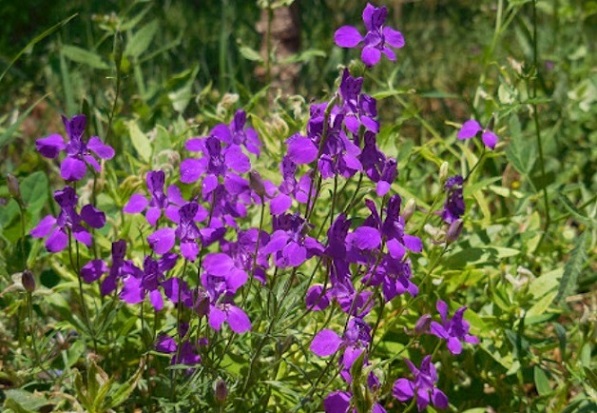Colon Cancer Breakthrough! New Research Uncovers Powerful Anticancer Potential in Common Medicinal Plants
Nikhil Prasad Fact checked by:Thailand Medical News Jun 24, 2025 7 months, 4 weeks, 1 day, 22 hours, 24 minutes ago
Thailand Medical News: Scientists from Türkiye and India have made a major discovery in the fight against colon cancer. Their new research reveals that certain plant extracts—particularly from the flower of Consolida orientalis—demonstrate powerful anticancer effects in laboratory settings and may lead to safer, more effective chemotherapy drugs in the future.
 Plant extracts - particularly from the flower of Consolida orientalis - demonstrate powerful anticancer effects in lab settings
Plant extracts - particularly from the flower of Consolida orientalis - demonstrate powerful anticancer effects in lab settings
This
Thailand Medical News report sheds light on a study conducted by researchers from Sivas Cumhuriyet University (Türkiye), Yıldızeli Vocational School (Türkiye), Koyulhisar Vocational School (Türkiye), NIMS University (India), and the Indian Institute of Science Education and Research (IISER) in Punjab. These researchers tested three plant species—Consolida orientalis, Smyrnium rotundifolium, and Euphorbia virgata—against human colon cancer cells (HT-29) and healthy colon cells (CCD-18Co) using in vitro laboratory techniques.
Natural Plant Extracts Show Promise Against Colon Cancer
In the study, extracts from the aerial and flower parts of the plants were prepared using ethanol and applied to cancerous and healthy colon cells. All three plant extracts showed the ability to kill cancer cells after 72 hours, but with varying degrees of effectiveness and safety.
Smyrnium rotundifolium was found to be the most toxic to cancer cells. However, it also severely damaged healthy colon cells, making it less desirable as a treatment.
Euphorbia virgata also showed anticancer effects but similarly harmed normal cells at a high rate.
Consolida orientalis, in contrast, not only effectively destroyed colon cancer cells but also preserved the health of normal cells far better than the other two.
The ethanol extract from Consolida orientalis flowers was particularly notable for its high cancer-cell-killing ability and its relatively low toxicity to healthy cells—giving it a potential advantage as a safer and more selective chemotherapeutic agent.
Key Compounds Identified in the Cancer Fight
The research team used sophisticated molecular tools such as Conceptual Density Functional Theory (DFT) and molecular docking to understand how specific compounds in the plants interact with cancer-related proteins. Among 14 bioactive compounds found in Consolida orientalis, three stood out:
-4-Hydroxycinnamic acid
-Caffeic acid
-Chlorogenic acid
These molecules showed strong binding to a key protein involved in cancer progression called EGFR kinase. Chlorogenic acid, in particular, demonstrated the strongest interaction, forming five hydrogen bonds and maintaining stability over a 100-nanosecond molecular simulation. This means it could effectively block the cancer-promot
ing protein in a real biological environment.
Why Chlorogenic Acid Matters
Chlorogenic acid is already known for its antioxidant and anti-inflammatory properties, but this study confirmed that it also has strong potential in targeting cancer-specific proteins without harming healthy tissue. Its low "chemical hardness" and high electrophilicity (a measure of reactivity) make it highly suitable for therapeutic use. Compared to other compounds, it demonstrated greater bonding strength and stability when tested against colon cancer-related targets.
Conclusion
This research highlights the possibility of developing safer, plant-based chemotherapy agents, especially from Consolida orientalis. The flower extract shows excellent potential to selectively kill colon cancer cells while preserving healthy ones. Chlorogenic acid, one of its main components, stands out as a particularly promising anticancer compound thanks to its strong binding capabilities and chemical reactivity. If further studies confirm its effectiveness in living organisms, this could pave the way for new, low-toxicity cancer treatments that offer hope to millions worldwide suffering from colorectal cancer.
The study findings were published in the peer reviewed journal: Pharmaceuticals.
https://www.mdpi.com/1424-8247/18/7/943
For the latest on Colon Cancer, keep on logging to
Thailand Medical News.
Read Also:
https://www.thailandmedical.news/news/university-of-connecticut-clinical-study-finds-that-eating-walnuts-daily-lowers-risk-of-colon-cancer
https://www.thailandmedical.news/news/shiitake-mushrooms-show-incredible-promise-in-fighting-gut-inflammation-and-colon-cancer
https://www.thailandmedical.news/news/potential-of-plant-compounds-in-treating-colon-cancer
https://www.thailandmedical.news/articles/cancer
